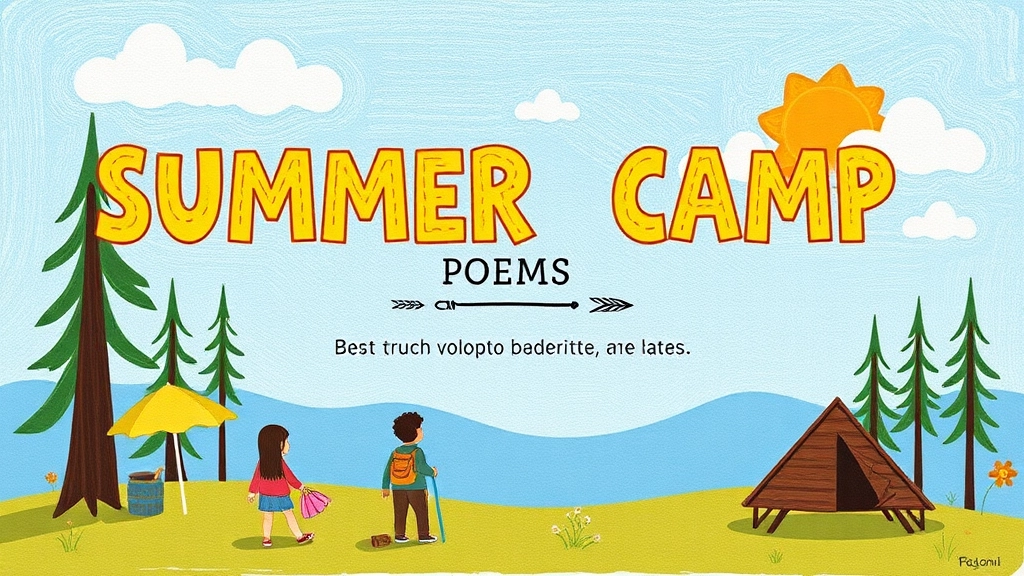Ever wondered how to capture the essence of summer camp in a way that resonates deeply?
Welcome to the enchanting world of Summer Camp Poems. This article explores the myriad ways poetry can encapsulate the magic of camp life, from celebrating nature and campfire nights to capturing the growth and self-discovery experienced during these memorable weeks.
We’ll delve into various themes, such as the camaraderie of camp friendships, the thrill of summer adventures, and even the fun and silly moments that make camp unforgettable. Whether you’re looking to create your own summer camp poem or find inspiration in kid-friendly verses, this guide offers a treasure trove of ideas to make your camp memories last forever. Join us as we explore how poetry can turn fleeting summer moments into lasting masterpieces.
Celebrating Nature in Summer Camp Poems
Ever wondered how to capture the beauty of nature in a summer camp poem? You’re not alone. Many of us head to summer camp to escape the hustle and bustle of daily life, and what better way to immortalise those moments than through poetry? Let’s dive into how we can celebrate nature in our summer camp poems.
Why Write Poems About Nature?
First off, why even bother writing poems about nature? Simple. Nature is inspiring. The rustling leaves, the chirping birds, the serene lakesâall these elements can stir deep emotions and spark creativity. When you put pen to paper, you’re not just writing; you’re capturing a slice of the natural world.
Elements to Include in Your Nature Poems
Here’s a quick checklist to get you started:
- Vivid Imagery: Describe what you see, hear, and feel. Use all your senses.
- Emotional Connection: Share how nature makes you feelâpeaceful, excited, introspective.
- Seasonal Elements: Focus on what makes summer uniqueâlong days, warm nights, blooming flowers.
Examples and Stories
Let me share a quick story. Last summer, I was at camp and woke up early to catch the sunrise over the lake. The sky was painted in hues of orange and pink, and the water mirrored this spectacle perfectly. I jotted down a few lines and before I knew it, I had a poem that captured that magical moment. Here’s a snippet:
“Morning light dances on the lake,
Whispers of dawn, a new day we make.”
Tips for Writing Nature Poems
- Start with a Walk: Take a stroll and observe your surroundings. Jot down notes.
- Use Metaphors and Similes: Compare elements of nature to familiar objects or feelings.
- Keep It Simple: Don’t overcomplicate. Sometimes, the simplest lines are the most powerful.
Inspiration from Famous Poets
Take a leaf out of the books of famous poets like Robert Frost or William Wordsworth. They had a knack for capturing the essence of nature in their poems. For instance, Frost’s âStopping by Woods on a Snowy Eveningâ is a masterclass in using simple language to evoke powerful imagery.
Internal Linking Opportunity
If you’re interested in more tips on writing, check out our section on Creating Your Own Summer Camp Poem. It’s packed with actionable advice to help you craft your masterpiece.
For more creative ideas during your camp, you might also enjoy our Summer Camp Coloring Pages article.
Poems About Campfire Nights and Stories
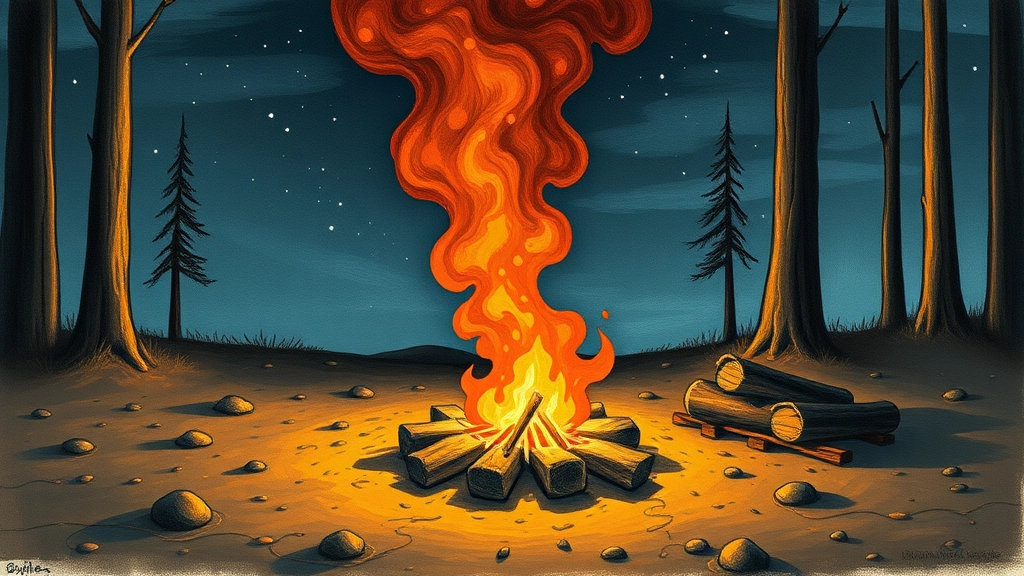
Ever sat around a campfire and wondered how to capture that magic in words?
Campfire Nights: Why They Matter
Campfire nights are the heart of summer camp.
The crackling fire, the starry sky, and the stories shared create unforgettable moments.
But how do you turn these experiences into poetry?
Crafting Your Campfire Poem
Here’s how you can start:
- Focus on Senses: What do you see, hear, and smell?
- Capture Emotions: Is it excitement, nostalgia, or something else?
- Use Imagery: Paint a picture with your words.
Example: Telling Campfire Stories
Imagine this:
A group of kids huddled close, faces lit by the fire.
One begins a tale of adventure, and everyone is hooked.
That’s your poem’s backbone.
Why Poems About Campfire Nights?
These poems are more than words.
They’re a way to relive those nights, to share them with others.
And they’re a chance to reflect on the connections made.
Tips for Writing
- Keep it Simple: Short lines can be powerful.
- Be Genuine: Write what you truly felt.
- Experiment: Try different styles until one fits.
Friendship and Camaraderie in Camp Life
What’s the deal with summer camp friendships? You know, those bonds that feel like they could last a lifetime? You’re not alone if you’ve wondered why camp friendships often feel so special and different from everyday life. Let’s break down why these connections matter and how they shape our camp experience.
Why Camp Friendships Are Unique
When you’re at summer camp, you’re thrown into a new environment with a bunch of people you’ve never met. It’s a bit like the first day of school, but with more mosquito bites and less homework. Here’s why these friendships stand out:
- Shared Experiences: Whether it’s a challenging hike or a hilarious campfire story, you and your campmates go through it all together. These shared moments create a strong bond.
- Limited Distractions: Without the usual distractions of social media and school stress, you get to focus on the people around you. This makes interactions more genuine.
- Team Activities: From team sports to group crafts, camp activities are designed to foster teamwork and cooperation, naturally bringing people closer.
Real-Life Stories: The Magic of Camp Friendships
Take Sarah, for example. She was super shy before she went to camp. But after spending two weeks sharing a cabin with a group of girls, she came out of her shell. They supported her during a tough hike and cheered her on during the talent show. By the end of camp, Sarah had a newfound confidence and a group of friends she still keeps in touch with years later.
Or consider Jake, who found his best friend at camp. They bonded over their love for fishing and spent countless hours at the lake. Even though they live in different cities, they make it a point to meet up every summer. These friendships aren’t just for the camp; they extend far beyond it.
Building and Maintaining Camp Friendships
So, how do you make these friendships last? Here are some tips:
- Stay in Touch: Exchange contact details and make an effort to stay connected. Social media can be a great tool for this.
- Plan Reunions: If possible, plan to meet up outside of camp. It could be a weekend visit or attending the same camp next year.
- Be Genuine: Authenticity goes a long way. Be yourself, and you’ll attract friends who appreciate you for who you are.
- Support Each Other: Just like you did at camp, continue to support each other through life’s ups and downs.
The Impact of Camp Friendships on Personal Growth
Camp friendships do more than just fill your summer with fun; they contribute to your personal growth. Here’s how:
- Boosted Confidence: Knowing you have friends who support you can boost your self-esteem.
- Social Skills: Navigating new friendships helps improve your social skills, making you more adept at forming connections in other areas of life.
- Emotional Support: Camp friends often become a source of emotional support, helping you through difficult times.
Reflecting on Camp Friendships Through Poetry
Poetry can be a powerful way to capture the essence of these unique friendships. Writing a poem about your camp experiences can help you reflect on the bonds you’ve formed and the memories you’ve made. It’s a creative way to keep those connections alive in your heart.
Poems on Growth and Self-Discovery During Summer Camp
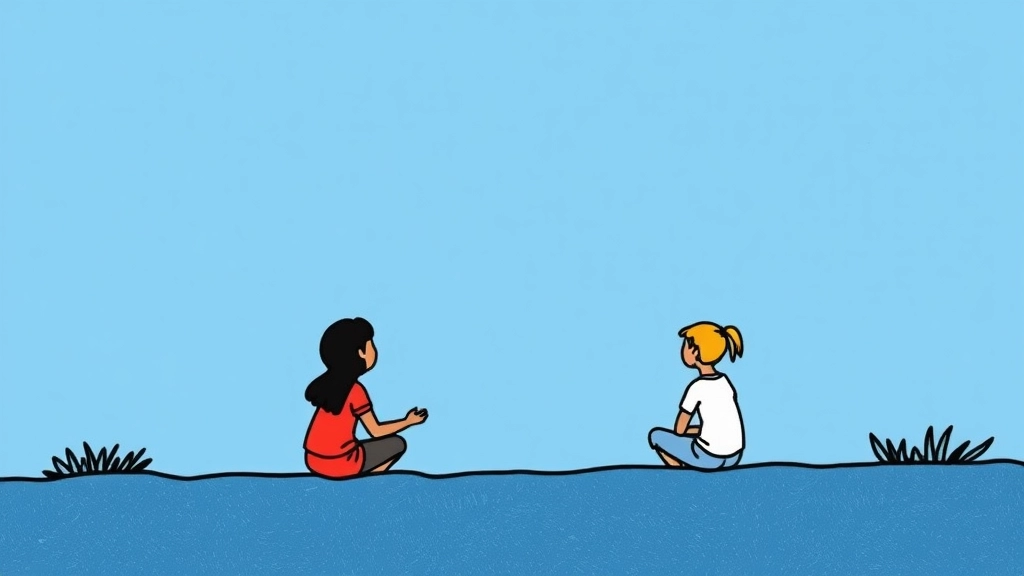
Ever wondered how summer camp can change you?
Or how it can help you grow and discover new things about yourself?
Let’s dive into that.
Why Summer Camp is a Game-Changer
Summer camp isn’t just about fun and games.
It’s a place where you get to know yourself better.
You face challenges, make decisions, and learn to stand on your own two feet.
The Power of Poetry in Capturing Growth
Poetry is a fantastic way to capture these moments of growth and self-discovery.
Here’s why:
- Reflection: Writing a poem makes you think about your experiences deeply.
- Expression: It helps you articulate your feelings and thoughts.
- Memory: Poems are a great way to remember and cherish your camp memories.
Real-Life Examples
Like that time I climbed the rock wall for the first time.
I was terrified.
But I did it.
Writing a poem about it made me realise how strong and brave I could be.
Or when I made a new friend who was completely different from me.
Putting that into a poem helped me see the value of diversity and understanding.
Tips for Writing Your Own Growth Poems
- Start with a Moment: Think of a specific experience at camp that made you grow.
- Use Vivid Imagery: Describe what you saw, heard, and felt.
- Be Honest: Write about your true feelings and thoughts.
- Keep it Simple: You don’t need fancy words. Just be real.
Example Poem
Here’s a quick example to get you started:
In the woods, I found my strength, Climbing high, at arm's length. Fear was there, but so was I, Reaching up to touch the sky.
Exploring Summer Adventure Through Poetry
What’s the Deal with Summer Adventure?
Ever wondered how to capture the essence of your summer adventures in a way that lasts forever? You’re not alone. Many of us struggle to find the right words to describe those unforgettable moments. That’s where poetry comes in. It’s like bottling up the magic of summer and keeping it with you, no matter the season.
Why Poetry?
First off, let’s talk about why poetry is the perfect medium for exploring summer adventures. Poetry cuts through the noise and gets straight to the heart of what you’re experiencing. It’s short, sweet, and packs an emotional punch.
How to Get Started
So, how do you start writing poetry about your summer adventures? Here are some tips to make it easier:
- Keep it Simple: Don’t overthink it. Start with a few words or a phrase that captures a moment.
- Use Your Senses: Describe what you see, hear, smell, touch, and taste.
- Be Honest: Write what you feel. Authenticity is key.
Example: A Day at the Lake
Imagine a day at the lake. The sun is shining, the water is sparkling, and you’re with your best mates. Here’s how you could turn that into a poem:
The sun kisses the lake,
Ripples dance in its wake.
Laughter echoes through the air,
Friendship beyond compare.
The Power of Imagery
One of the best things about poetry is its ability to paint vivid pictures with words. When you’re writing about your summer adventures, use strong imagery to bring your experiences to life. Think about the colours, the sounds, and the feelings.
Adventure Themes to Explore
Here are some themes you might want to explore in your summer adventure poems:
- Nature: The beauty of the great outdoors.
- Friendship: The bonds you form and strengthen.
- Discovery: New places, new experiences, and self-discovery.
- Joy: The simple pleasures of summer fun.
Real-Life Examples
Let’s break it down with some real-life examples. Remember that time you went hiking and stumbled upon a hidden waterfall? Or the night you spent stargazing with your friends? These moments are goldmines for poetic inspiration.
Hiking Adventure
We climbed the rugged path,
Through forests deep and vast.
A waterfall, hidden and pure,
Nature’s secret, our hearts secure.
If you’re looking for more inspiration for your summer adventures, check out these top summer camps in Rochester, NY for new experiences.
Stargazing Night
Under the velvet sky,
Stars winked from on high.
Whispered dreams and silent sighs,
Friendship in the night’s embrace lies.
For those interested in a more structured adventure, consider exploring the best STEM education summer camps for kids to combine fun with learning.
The Takeaway
The beauty of summer adventures is that they’re fleeting but unforgettable. By turning them into poetry, you’re creating a lasting tribute to those moments. So grab a pen, or your phone, and start jotting down your summer memories. You’ll be surprised at how quickly they turn into beautiful poems.
Fun and Silly Summer Camp Poems for Kids
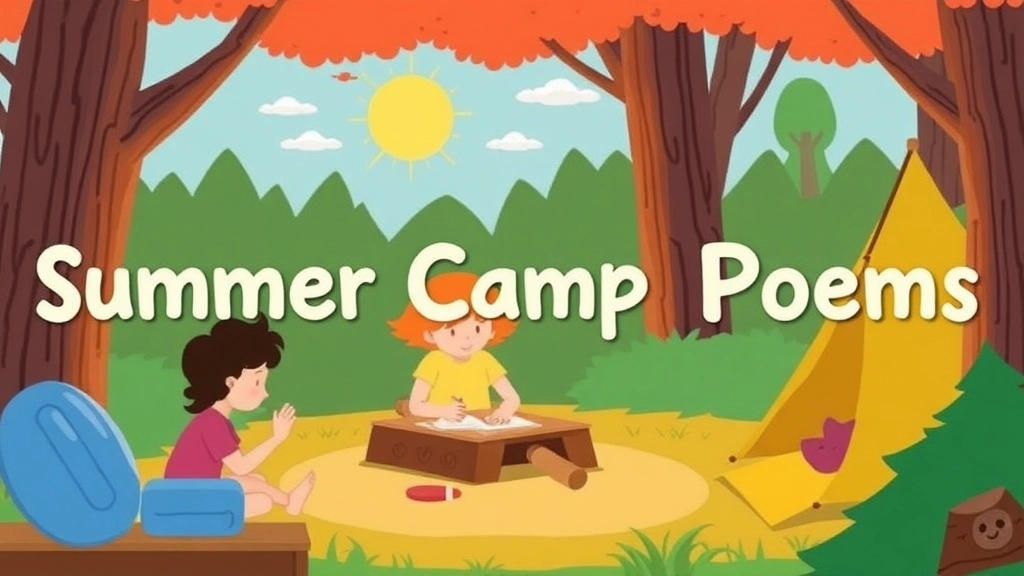
Ever wondered how to keep kids entertained and engaged at summer camp?
Fun and silly poems might be your answer.
Kids love a good laugh, and what’s better than a poem that tickles their funny bone?
Why Poems?
- Short and Sweet: Kids have short attention spans.
- Easy to Memorise: Perfect for campfire recitals.
- Interactive: Poems can be acted out, making them more engaging.
What Makes a Poem Fun and Silly?
- Rhymes: Kids love the musicality of rhymes.
- Funny Characters: Think talking animals or magical creatures.
- Unexpected Twists: Keep them guessing.
Examples of Fun and Silly Poems
Let me share a couple of examples:
The Wiggly Worm
There once was a worm named Fred,
Who wiggled right out of his bed,
He danced all night,
Under the moonlight,
And now he’s a sleepyhead!
The Laughing Llama
A llama who loved to giggle,
Wore a hat that made him wiggle,
He laughed so hard,
In the barnyard,
He caused quite the jiggle!
Tips for Writing Your Own Silly Poems
- Start with a Funny Idea: Think of something that makes you laugh.
- Use Simple Words: Keep it easy for kids to understand.
- Add a Twist: Surprise endings are always a hit.
Why It Works
- Relatable: Kids can see themselves in the funny situations.
- Memorable: A good laugh sticks with them.
- Interactive: Encourage kids to come up with their own silly poems.
Making It Interactive
- Poetry Slam: Host a fun competition.
- Act It Out: Create mini-dramas based on the poems.
- Illustrate: Have kids draw scenes from the poems.
Real Stories
I remember a camp where we had a “Silly Poem Night.”
Kids were laughing so hard, they could barely finish their lines.
One poem about a clumsy kangaroo had everyone in stitches.
By the end of the night, even the shyest kids were eager to share their own creations.
Why This Matters
Fun and silly poems do more than just entertain.
They build confidence, encourage creativity, and foster a sense of camaraderie.
Plus, they make for unforgettable camp memories.
Final Thoughts
If you’re looking to add a splash of fun to your summer camp, silly poems are a no-brainer.
They’re easy to create, fun to share, and loved by kids.
So, why not give it a try?
Your campers will thank you.
And who knows?
You might just discover the next Dr. Seuss in your midst.
Ready to get started?
Grab a pen, think of something silly, and let the fun begin!
Fun and silly summer camp poems for kids—it’s a game-changer.
Using Poetry to Reflect on Farewells and Goodbyes at Camp
Ever been at summer camp, feeling the weight of saying goodbye? It’s tough, right? Those last days are packed with memories, laughter, and maybe a few tears. But guess what? Poetry can help us process all those emotions. Let’s dive into how poetry can make those farewells a bit easier.
Why Use Poetry for Goodbyes?
Saying goodbye is never easy. You’ve spent weeks building friendships, exploring nature, and discovering new things about yourself. As camp ends, there’s a whirlwind of emotions. Poetry gives us a way to capture those fleeting moments and feelings. For more ideas on creating lasting memories, check out our summer camp aesthetic guide.
Why it works:
- Emotion-packed: Poetry lets us express deep emotions concisely.
- Personal touch: Each poem is unique, just like your camp experience.
- Memory keeper: Poems preserve memories in a creative way.
How to Write a Farewell Poem
Not sure how to start? Here’s a simple guide to get your thoughts flowing:
- Reflect on Experiences:
- Think about your favourite camp memories.
- What moments stand out? Jot them down.
- Choose Your Style:
- Haiku: Short and sweet, perfect for capturing a single moment.
- Free Verse: No rules, just your thoughts flowing naturally.
- Focus on Feelings:
- How do you feel about leaving? Excited? Sad? Grateful?
- Use vivid imagery to express these emotions.
- Keep it Simple:
- Don’t overthink it. Let your words come naturally.
- Use metaphors or similes to add depth.
Example Poem
Here’s a quick example to inspire you:
Under starlit skies,
Whispers of laughter linger,
Goodbyes softly sung.
Sharing Your Poem
Once you’ve penned your masterpiece, consider sharing it:
- Campfire Reading: Gather your friends for a final campfire and share your poems.
- Camp Newsletter: Submit your poem to be featured in a camp newsletter or blog.
- Social Media: Share it online to connect with fellow campers.
The Impact of Farewell Poems
Writing a farewell poem isn’t just about saying goodbye. It’s about:
The Role of Outdoor Activities in Inspiring Poetry
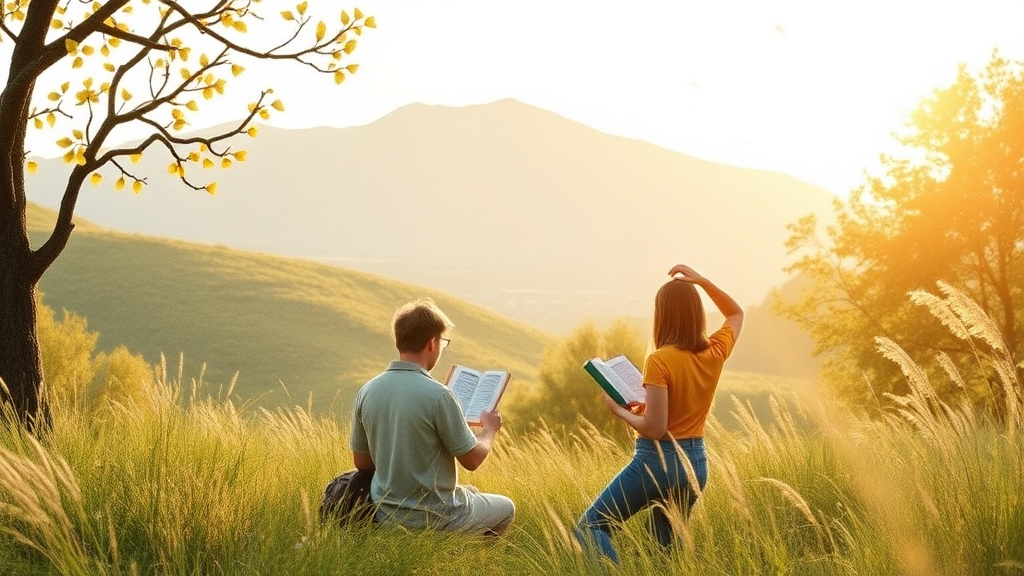
Ever wonder how outdoor activities can spark creativity?
Why does a simple hike or a canoe trip turn into a poetic masterpiece?
Let’s dive in.
How Nature Fuels Creativity
When we’re out in nature, something magical happens.
The sights, sounds, and smells stir up emotions.
And emotions are the fuel for poetry.
Imagine this:
- Hiking: Each step brings you closer to new perspectives. The rustle of leaves, the crunch of gravel—it’s a symphony.
- Canoeing: The rhythm of the paddles, the splash of water. It’s like a dance with nature.
Turning Experiences into Words
So, how do we turn these experiences into poetry?
Here’s a simple approach:
- Observe: What do you see? Feel? Hear? Jot it down.
- Reflect: How does it make you feel? Excited? Peaceful? Capture that emotion.
- Write: Start with a line or two. Don’t worry about perfection. Let it flow.
Personal Stories and Examples
Once, during a campfire night, I watched the flames dance.
The crackling wood whispered stories of old.
I scribbled a few lines, and suddenly, I had a poem.
Outdoor Activities and Poetry: A Perfect Match
Outdoor activities provide endless inspiration.
They teach us to see the world differently.
And that’s what poetry is all about.
Kid-Friendly Poems for Summer Camp Activities
Ever wondered how to keep kids entertained and engaged during summer camp? Poetry might just be the answer. Kid-friendly poems are a fantastic way to combine fun with learning, making camp activities memorable. Let’s dive into how you can use poetry to spice up your camp.
Why Poetry for Kids at Camp?
First off, why poetry? It’s simple. Poetry is short, sweet, and easy to remember. It’s like a snackable piece of literature that kids can munch on without feeling overwhelmed. Plus, it’s a great way to get them to express their feelings and experiences.
Types of Kid-Friendly Poems
- Nature Poems:
- These are perfect for hikes and outdoor activities.
- Example: âThe sun is bright, the sky is blue, the trees are tall, and so are you.â
- Campfire Poems:
- Ideal for those cosy nights by the fire.
- Example: âAround the campfire, stories we share, the crackling wood, the starry glare.â
- Friendship Poems:
- Great for team-building activities.
- Example: âTogether we stand, hand in hand, friends forever, in this camp land.â
- Adventure Poems:
- Perfect for those thrilling activities like zip-lining or canoeing.
- Example: âThrough the forest, over the stream, adventure awaits, like in a dream.â
How to Incorporate Poetry into Camp Activities
Storytime Sessions:
- Dedicate a time each day for kids to either read or recite poems.
- Encourage them to write their own poems about their day’s adventures.
Poetry Scavenger Hunts:
- Create a scavenger hunt where each clue is a line of a poem.
- Kids have to find the next line to complete the poem and reach the final treasure.
Campfire Poetry Nights:
- Have a night dedicated to poetry where kids can share their favourite poems or ones they’ve written.
- Make it fun by adding some s’mores and hot chocolate.
Benefits of Poetry at Summer Camp
- Creativity Boost: Kids get to flex their creative muscles.
- Emotional Expression: Helps them articulate feelings they might not easily express.
- Memory Skills: Reciting poems can improve their memory.
- Team Bonding: Sharing poems can bring kids closer together.
Real-Life Example
Last summer, we had a kid named Sam who was pretty shy. During one of our poetry sessions, he wrote a poem about his dog back home. The other kids loved it, and it became a hit around the campfire. By the end of the camp, Sam was the go-to guy for campfire poems, and he made a bunch of new friends. Poetry did that.
Creating Your Own Summer Camp Poem
Ever wondered how to capture those unforgettable summer camp moments in a poem?
You’re not alone.
Many of us want to put those campfire stories, friendships, and adventures into words but don’t know where to start.
Let’s break it down.
Why Write a Summer Camp Poem?
First off, why even write a poem about summer camp?
- To Relive Memories: Poems are a great way to remember your experiences.
- To Share with Friends: Share your poem with camp buddies. It’s a unique way to stay connected.
- To Express Yourself: Sometimes, words are the best way to express what you feel.
Getting Started: The Basics
Start Simple.
You don’t need to be Shakespeare to write a poem.
Here’s how:
- Choose a Theme: What do you want your poem to be about? Friendship? Adventure? Campfire nights?
- Jot Down Ideas: Write down words or phrases that come to mind.
- Structure: Decide if you want it to rhyme or be free verse. Both work.
Example: A Simple Template
Here’s a quick template to get you started:
- Line 1: Describe the setting (e.g., âUnder the starry skyâ).
- Line 2: Mention an activity (e.g., âWe shared stories by the campfireâ).
- Line 3: Add emotions (e.g., âLaughter echoed through the nightâ).
- Line 4: Conclude with a thought (e.g., âThese moments, forever in our heartsâ).
Tips to Make It Pop
Want to make your poem stand out?
Here are some tips:
- Use Sensory Details: Describe what you see, hear, smell, touch, and taste.
- Be Specific: Mention specific names, places, or events.
- Keep It Real: Authenticity resonates. Don’t worry about being perfect.
Sharing Your Poem
Once you’ve written your poem, don’t keep it to yourself.
- Read Aloud: Share it during a campfire session.
- Social Media: Post it on your social media. Tag your camp friends.
- Create a Keepsake: Write it in a journal or create a scrapbook page.
Real Example
Here’s a quick poem I wrote about my summer camp experience:
âUnder the starry sky,
We shared stories by the campfire,
Laughter echoed through the night,
These moments, forever in our hearts.â
Final Thoughts
Writing a summer camp poem is easier than you think.
It’s all about capturing the essence of your experience.
So grab a pen, jot down your thoughts, and start writing.
You’ll be amazed at how much fun it is.
And who knows?
Your poem might just become the highlight of the next campfire night.
Ready to give it a go? Check out our top summer camp chants to energize campers for more inspiration, or learn about the lifelong bonds formed at summer camp.
FAQs on Summer Camp Poems
What makes campfire nights special for poetry?
Campfire nights are the heart of summer camp. The crackling fire, starry sky, and shared stories create unforgettable moments perfect for poetry.
How can I start writing a campfire poem?
Begin by focusing on your senses: what you see, hear, and smell. Capture the emotions you feel, whether it’s excitement or nostalgia, and use vivid imagery to paint a picture with your words.
Why should I write poems about campfire nights?
These poems allow you to relive those magical nights and share them with others. They also offer a chance to reflect on the connections made during these moments.
What are some tips for writing growth and self-discovery poems at summer camp?
Start with a specific moment that made you grow. Use vivid imagery to describe what you saw, heard, and felt. Be honest about your feelings and keep it simple.
How can poetry capture growth and self-discovery at summer camp?
Poetry helps you reflect deeply on your experiences, articulate your feelings, and cherish your camp memories. It’s a fantastic way to capture moments of personal growth.
What makes a summer camp poem fun and silly?
Fun and silly poems often include rhymes, funny characters like talking animals, and unexpected twists. They are short, easy to memorize, and can be acted out for more engagement.
Why are fun and silly poems effective for kids at summer camp?
These poems are relatable, memorable, and interactive. They help build confidence, encourage creativity, and foster a sense of camaraderie among campers.
How do outdoor activities inspire poetry?
Outdoor activities like hiking and canoeing stir up emotions through the sights, sounds, and smells of nature. These emotions fuel creativity and make for rich poetic material.
What’s a simple approach to turn outdoor experiences into poetry?
Observe your surroundings and jot down what you see, feel, and hear. Reflect on your emotions and start writing a few lines without worrying about perfection. Let your thoughts flow naturally.
Can you give an example of a fun and silly summer camp poem?
Sure! Here’s one:
The Wiggly Worm
There once was a worm named Fred,
Who wiggled right out of his bed,
He danced all night,
Under the moonlight,
And now he’s a sleepyhead!
How can I make poetry interactive for kids at summer camp?
Host a poetry slam competition, act out the poems, or have kids illustrate scenes from the poems. These activities make poetry more engaging and fun.
Why is it important to include poetry activities at summer camp?
Poetry activities build confidence, encourage creativity, and create unforgettable camp memories. They also help kids express themselves and connect with others.
References
-
Poetry Foundation – A resource for poems and poets, providing a rich collection of poetry.
-
Poets.org – A comprehensive site for poetry, offering collections and resources for poets and poetry lovers.
-
Poetry Society of America – Supporting poets and promoting poetry in the United States.

